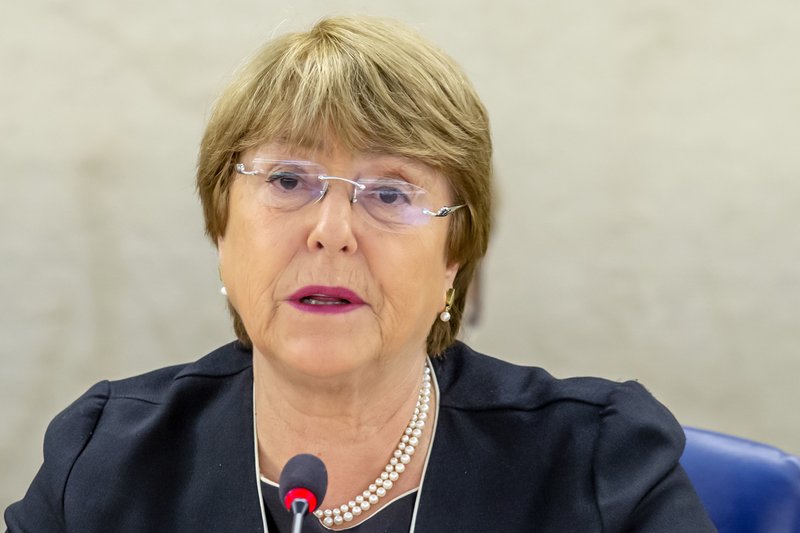GENEVA -- Venezuela's government registered nearly 5,300 killings during security operations last year linked to cases of "resistance to authority," the U.N. human-rights chief reported Thursday, denouncing a "shockingly high" number of extrajudicial killings.
Michelle Bachelet's report focusing on the past 18 months follows her trip last month to the troubled South American country and draws upon more than 550 interviews conducted by her office with rights defenders, victims, witnesses of rights violations and other sources. She and her teams held nearly 160 meetings with state and other stakeholders. Bachelet, a former socialist president of Chile, met with Venezuelan President Nicolas Maduro last month.
Authorities in Maduro's government tallied 5,287 killings during security operations that were classified as cases of "resistance to authority," plus another 1,569 this year through May 19, the report said. It also cited separate figures by the Venezuelan Violence Observatory of at least 7,523 such killings of that type last year, plus at least 2,124 from January to May this year.
"The incidence of alleged extrajudicial killings by security forces, particularly the special forces (FAES), in the context of security operations has been shockingly high," Bachelet's office said.
People interviewed consistently referred to the Special Action Force, known by the Spanish abbreviation FAES, as a "death squad" or "extermination group." Nongovernmental organizations say the force is responsible for hundreds of killings.
Among more than 20 recommendations on issues like ensuring media freedom and providing proper health care, she called for disarming and disbanding pro-government armed groups known as "collectivos."
The report from an ostensibly impartial observer like the United Nations comes as Venezuela's internal turmoil of recent years has divided the international community. More than 50 countries, including the United States, many South American neighbors of Venezuela and European nations, have recognized opposition leader Juan Guaido as Venezuela's legitimate leader, even though Maduro remains in power.
Maduro's government blasted an "openly biased" account that presented a "distorted version" of actual conditions.
"There are countless inaccuracies, errors, facts taken out of context and false assertions," it said.
Venezuelan officials insisted that the report overlooked visits by U.N. observers in March to jails, hospitals, public housing programs and distribution centers for medicine and food, and said it "omits in its entirety the achievements and advances achieved" by the country in the field of human rights.
Maduro's government has been struggling to regain control of the international narrative about the oil-rich country, notably through its recent overtures to international groups like the Red Cross and U.N. agencies -- many of which are trying to help beleaguered civilians. The U.N. says that more than 4 million people have left the country in recent years, putting strains in particular on neighbors Brazil and Colombia, as well as Peru.
Venezuela has denied victims of their "rights to truth, justice, and reparation," the report said. "If the situation does not improve, the outflow of Venezuelan migrants and refugees will continue, and the living conditions for those remaining will worsen."
Many findings of the report highlighted well-worn themes during Venezuela's continued economic and political crisis: a wobbly health care system, rising disease, food shortages and the strains caused by runaway inflation.
In a nod to the Venezuelan government's claims about the country's crisis, Bachelet acknowledged that recent sanctions have made the situation worse, but added that its economy was already in distress before their implementation.
The U.N. findings note the shortages of 60% to 100% of essential drugs in four of Venezuela's major cities, including Caracas. Lack of all types of contraceptives have led to higher risk of HIV and an increase in preventable maternity mortality, with an estimated 20% linked to unsafe abortions.
The report cited repression of political opponents, arbitrary detentions, and cases of torture and cruel treatment including electric shocks, suffocation with plastic bags, waterboarding and sexual violence.
"We have the government's commitment to work with us to resolve some of the thorniest issues -- including the use of torture and access to justice -- and to allow us full access to detention facilities," Bachelet said in a statement.
"We should all be able to agree that all Venezuelans deserve a better life, free from fear and with access to adequate food, water, health care, housing and all other basic human needs," she added.
The report comes on the heels of an attack on 16-year-old high school student Rufo Chacon, who was blinded Monday after police fired buckshot at protesters in the western state of Tachira, and the death of Rafael Acosta Arevalo, a navy captain who died days after he was arrested on treason charges in Caracas. In a hearing the day before his death, Arevalo was seen using a wheelchair, his face bruised and his nails marked with blood.
Tamara Taraciuk Broner, senior Americas researcher at Human Rights Watch, praised the report for exposing human-rights violations like the excessive use of force, torture and extra-judicial killings. But she said it failed to call for a commission to investigate the violations and urged Bachelet to clearly lay out the government's responsibility for the deepening humanitarian crisis.
Bachelet is set to present her report today to the Human Rights Council in Geneva, where Venezuela will have a right of reply.
Information for this article was contributed by Jamey Keaten and Scott Smith of The Associated Press; and by Patricia Laya and Alex Vasquez of Bloomberg News.
A Section on 07/05/2019
